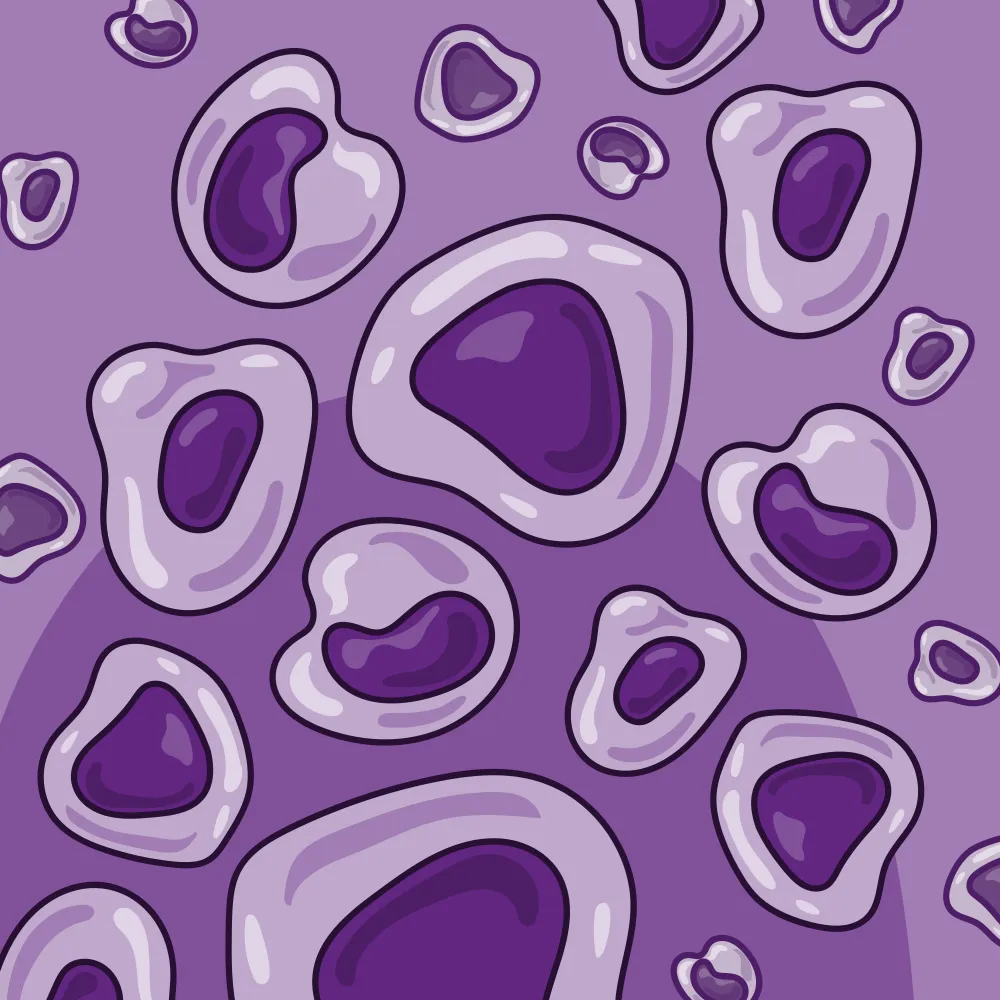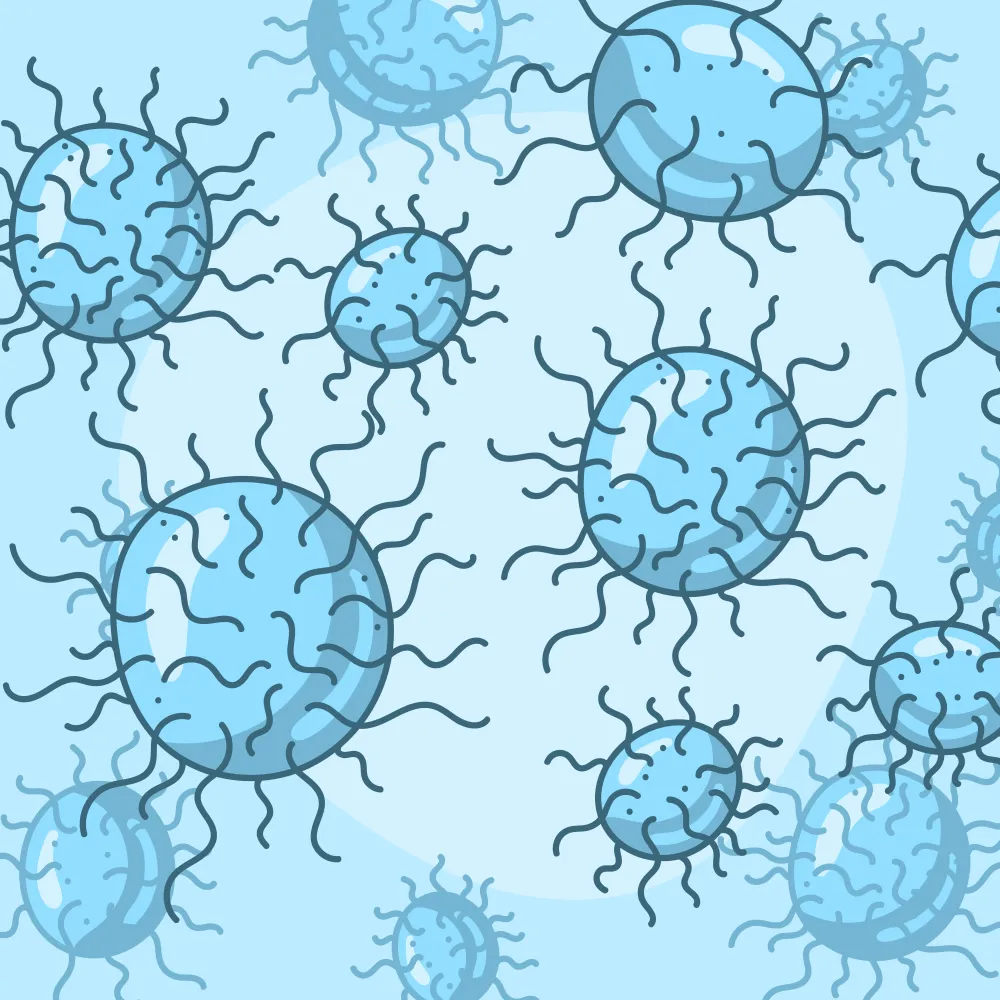At Freddie, we want to give everyone the tools they need to have safer sex. That means friendly, judgment-free information about taking care of your health – including STIs. Read on for our guide to syphilis.
What is syphilis?
Syphilis is a sexually transmitted infection (STI) that has seen a surge in cases in recent years. It can cause sores (known as “chancres”) on or in your genitals, around your anus or in your rectum, and on your lips or inside your mouth. It’s transmitted when someone else comes into contact with these sores or infectious bodily fluids like blood, semen, anal fluid and vaginal fluid.
Many people with syphilis won’t know they have it. If someone does get symptoms, these can resolve on their own – but the infection will still be causing damage to the body. When syphilis is left untreated for multiple years, it can cause serious complications in organs like your heart and brain.
Thankfully, syphilis is simple to test for and easy to treat if it’s caught early! You can diagnose it with a blood test and treat it with injected or oral antibiotics.
What are the symptoms of syphilis?
Syphilis has three stages with different symptoms. Not everyone will have symptoms, but these are the most common.
Primary syphilis
These symptoms usually show up two to three weeks after infection. They can include:
- A small, firm, painless sore or sores (chancre) around your genitals, rectum, lips and/or mouth. Sometimes this can be inside the body, so you can’t see it.
- Swollen glands in your groin, neck, or armpits
Most people only get one sore. These also disappear after three to six weeks, whether you’ve had treatment or not.
Secondary syphilis
These symptoms tend to show up two to three months after infection. They can include:
- A new, non-itchy rash, usually on on the chest, stomach, palms of your hands, soles of your feet, or genitals
- Small skin growths (that look like warts), usually on the anus
- Flu-like symptoms (fever, headache, muscle aches, fatigue, lack of appetite)
- Hair loss
- Weight loss
These symptoms can also resolve on their own, but syphilis will still be causing damage to the body. The infection can also still be passed on to other people.
Late syphilis
This is sometimes known as “latent syphilis” or “tertiary syphilis”. It’s where the infection has been present in the body for a long time – multiple years, or even decades – and has been causing damage to organs in the body.
Someone may have no symptoms for many years during this time. When symptoms do appear, they can be severe and include:
- Stroke
- Dementia
- Aneurysms
- Personality changes
- Visual problems or blindness
- Numbness
- Loss of coordination
- Meningitis
- Heart problems
- Death
Someone can still transmit syphilis for up to two years following their infection, possibly longer. After this period, they stop becoming infectious but syphilis will still be affecting their body. Syphilis can still be treated even at this late stage, but it won’t reverse any damage it has caused.
How is syphilis transmitted?
Syphilis is transmitted when someone comes into contact with a sore or sores. It can also be transmitted through infectious bodily fluids like blood, semen, anal fluid or rectal fluid. These fluids need to get inside your body for a transmission to happen, usually through a mucous membrane. These are moist parts of your body like your mouth, rectum or genitals.
Common ways syphilis is transmitted are:
- Anal, vaginal or oral sex
- Sharing sex toys
- Deep, wet kissing (if someone has a sore in their mouth)
- Sharing equipment to inject drugs
- During pregnancy and childbirth
How is syphilis treated?
Syphilis is treated with the antibiotic penicillin, which is usually taken as two injections (one in each buttock) at the same time. If someone is in a later stage of syphilis or they are pregnant, higher doses may be needed. For people who are allergic to penicillin, a course of oral doxycycline is an alternative treatment.
If you find out you have syphilis, getting treatment is very important. This is because syphilis can have serious, long-term effects even if you don’t have symptoms. Once you’ve had treatment, you’ll need to avoid sex for at least seven days. If you had a rash or sores, you should also wait until these are fully healed before having sex again.
Once you’ve been treated for syphilis, you can still get syphilis again. Treatment is still effective even if you’ve had syphilis before. However, it’s important to note that if you are getting routine testing and you’ve had syphilis before, then you should tell your clinician so that they can order the right type of test and interpret your results correctly. This is because a previous infection may show up on certain types of syphilis test – in some cases, this can happen for life. It doesn’t mean you have a current case of syphilis.
How do you prevent syphilis?
Abstinence is the only guaranteed way to avoid STIs. This isn’t a realistic option for most of us! There are ways you can reduce STI risk when you do have sex, and these are the most effective ones.
Condoms
Barriers like condoms and dental dams can reduce risk for bacterial STIs like syphilis. They need to be used for every type of sex you have (this includes oral sex), otherwise there is still an STI risk. You also need to use condoms the whole time you’re having sex, not just when you or your partner cums. If you use toys, then use a new condom for each new hole or if you swap toys between partners.
Condoms prevent fluid transmission between partners, but syphilis can also be transmitted by coming into contact with a sore. This means condoms are only effective if they cover the entire sore – some people don’t know they have them, or have them inside their body. In these cases, syphilis could still be transmitted even if a condom was used.
DoxyPEP
DoxyPEP is short for Doxycycline Post-Exposure Prophylaxis. It’s where you take an antibiotic (doxycycline) after condomless sex to help prevent syphilis, chlamydia and gonorrhea. It can reduce, but does not eliminate, bacterial STI risk.
DoxyPEP needs to be taken within 72 hours after condomless oral sex, anal sex or insertive vaginal sex. Ideally it should be taken within 24 hours.
DoxyPEP is for men who have sex with men, trans women and other gender-diverse people who were born with a penis. This is because the research supporting DoxyPEP showed it was effective in people with these body types.
Unfortunately, research suggests DoxyPEP is not as effective for people who were born with vaginas. This includes cis women, trans men and other gender-diverse people with this body type. At this time, DoxyPEP is not recommended for these people – however, you can speak to your clinician to decide what might be best for you.
Some researchers have cautioned that using doxycycline for DoxyPEP may increase the risk of antibiotic resistance, particularly when used inconsistently. Public health units are carefully considering these risks alongside the benefits of reducing STI transmission. At the time of writing, DoxyPEP has been formally endorsed by America's Centers for Disease Control and Prevention. The Public Health Agency of Canada is currently conducting its review.
If you’re taking DoxyPEP, make sure you tell your clinical team when you are getting STI tests. This is because it can affect syphilis testing.
I’ve been exposed to syphilis. What should I do?
If a partner tells you they have syphilis, you should get tested as soon as possible even if you don’t have symptoms. While you are waiting for your results, you should also avoid having sex. In some cases, you may be treated for syphilis before your results come in as a precaution.
You can get testing and treatment for STIs at sexual health clinics, walk-in clinics, family doctors, public health clinics, and some community health centres.
I have symptoms of an STI. What should I do?
If you have any STI symptoms like genital or anal discharge, pain when peeing, or new sores or rash, then make an appointment with a healthcare provider as soon as possible. If you have symptoms like genital discharge, they can often diagnose and treat you the same day.
At your appointment, your care provider may do a swab of your genitals and/or rectum (depending on your symptoms). They may also take a urine sample.
Your clinician might send your sample off for more tests, depending on what symptoms you have. You will usually hear back from them when these results are in.
I just tested positive for syphilis. What now?
If you’ve tested positive, try not to panic. STIs are common, and they can happen whether you’ve had one or 100 partners. Treatment for syphilis is often simple – in fact, it’s been the same since the 1940s!
If you’ve had a positive test result and haven’t yet got treatment, make an appointment with your care provider or go to walk-in hours as soon as possible. Don’t have sex until you’ve been treated and your clinician says it’s safe to do so. This is usually seven days after you’ve completed the full course.
When you test positive for any STI, you’ll need to tell any recent or ongoing partners. This is important because it ensures they can get tested or treated, helping prevent health complications or them passing an infection on.
If you don’t feel comfortable reaching out to a partner directly, then there are services available to send an anonymous text to someone saying they’ve had an STI exposure. Just remember that if your partner is only sleeping with you, then they will know who the message is coming from.












